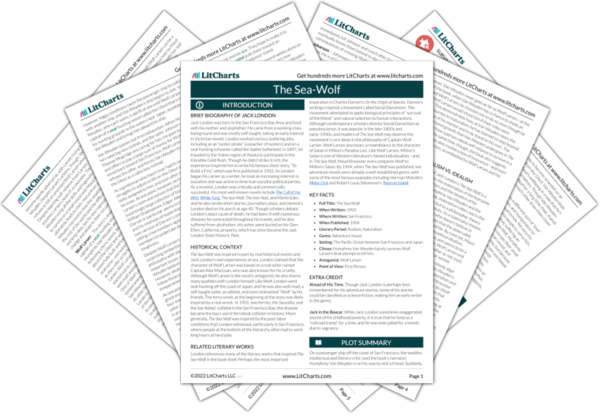Wind, which is often important to sailors, plays a key role in several of the events in The Sea-Wolf, and its unpredictable nature helps to portray how sailors—and humans in general—are subject to random chance. Perhaps one of the most fateful cases of wind’s influence occurs when Humphrey Van Weyden and Maud Brewster are trying to escape the cruel captain Wolf Larsen, only to have an unexpected, unfavorable wind strand them on a deserted island instead. Generally, wind represents an obstacle or potential danger. However, wind can also assume a more benevolent role. At the very end of the story, for example, the stormy sea becomes calm after the death of Wolf Larsen, and this calm weather allows Van Weyden and Brewster to finally be rescued by a large ship from the U.S. that spots them. Wind’s variable influence, therefore, suggests that random chance can be both a positive and a negative influence on humanity. Wind also shows how characters are feeling internally. The novel sometimes refers to Wolf Larsen’s bad moods as “squalls” (periods with heavy wind), and stormy weather conditions with high wind accompany many of the story’s darkest psychological moments.
Wind Quotes in The Sea-Wolf
Then a most surprising thing occurred. The captain broke loose upon the dead man like a thunderclap. Oaths rolled from his lips in a continuous stream. And they were not namby-pamby oaths, or mere expressions of indecency. Each word was a blasphemy, and there were many words. They crisped and crackled like electric sparks.
“I don’t think it was worth it,” I said to Wolf Larsen, “a broken boat for Kelly’s life.”
“But Kelly didn’t amount to much,” was the reply. “Good-night.”
I looked at my watch. It was one o’clock. I had slept seven hours! And she had been steering seven hours! When I took the steering-oar I had first to unbend her cramped fingers. Her modicum of strength had been exhausted, and she was unable even to move from her position. I was compelled to let go the sheet while I helped her to the nest of blankets and chafed her hands and arms.
“One kiss, dear love,” I whispered. “One kiss more before they come.”
“And rescue us from ourselves,” she completed, with a most adorable smile, whimsical as I had never seen it, for it was whimsical with love.












